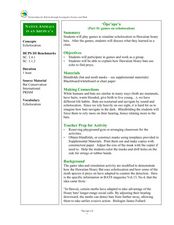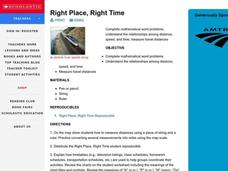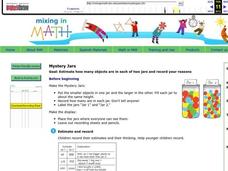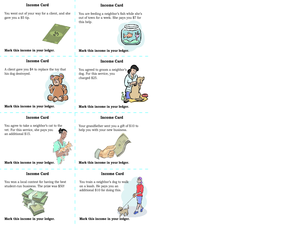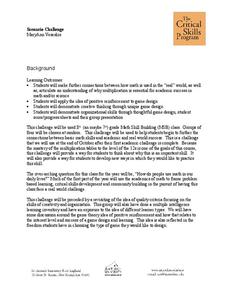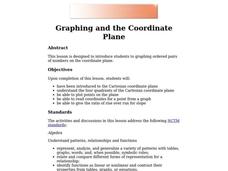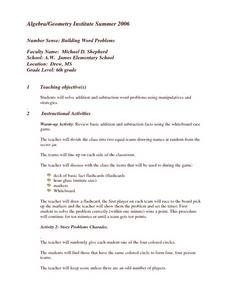National Security Agency
Are You Game? A Lesson Connecting Fractions and Probability
Exactly how fair are the board games children grow up playing? Young mathematicians investigate this questions as they work their way through this five-lesson series on basic probability.
Curated OER
Games on Echolocation
Get a little batty with life science! This fun simulation game replicates how bats use echolocation to hunt moths in their native Hawaiian habitat. After creating blind folds and discussing some basic principles of echolocation, learners...
Mathalicious
XBOX Xpotential
Touchdown! This is an exponentially insightful lesson that explores the growth of football games with different video game consoles. Class members discuss whether the increase of mergahertz can be described as linear or exponential. The...
Curated OER
The Games Robots Play
Students learn about how robots are programmed to play games. They then construct robot applications (basic computer codes) for playing tic-tac-toe comprised of if-then logic sequences. Students then compete in teams using their...
Curated OER
Geometric Fractals and the Chaos Game
Learners define fractals and patterns. They explore how a seemingly random process can result in a pattern. Students practice probability and fractions skills by playing the chaos game online.
Curated OER
Real Math
Students explore careers that require math knowledge and solve real life math problems. As a class, they compare and contrast classroom math to real life math and explore the links between algebra, geometry and math skills used in...
Curated OER
Quarter, Nickel, Dime....
An engaging game called, "Quarter, Nickel, and Dime" is presented in this math lesson. Players are given an envelope with slips of paper that represent the three coins. In pairs, they play the game 18 times, and the whole class charts...
Curated OER
Conditional Probability and Probability of Simultaneous Events
Your statisticians examine the characteristics of conditional probability and the probability of simultaneous independent events. They perform computer activities to find probabilities for simple compound events. They examine the...
Curated OER
NUMB3RS - Season 2 - "Convergence" - Air Hockey
Learn how to use a matrix to organize data to solve a problem. This activity uses wins and losses to rank players for an air hockey tournament they wish to have. After practicing some basic matrix operations the class could do the...
Curated OER
The Very Busy Spider
Youngsters explore visual arts by participating in a geometry identification activity. They read the book The Very Busy Spider and identify the techniques spiders use to create webs. Have you ever noticed that their webs are geometric...
Curated OER
Number Recognition Games
Students explore number sense by participating in a math recognition activity. In this number identification lesson, students practice pronouncing names of numbers and matching the number with an amount of objects. Students practice...
Curated OER
Right Place, Right Time
Fourth graders complete mathematical word problems. They study the relationships among distance, speed, and time; and measure travel distances. They measure distances using a piece of string and a ruler and practice converting several...
Curated OER
Mystery Jars
This is a twist on the old "guess how many jellybeans" game. Using estimation and math skills, learners participate in a fun "mystery jars" activity, trying to make educated guesses at how many objects are in two jars. The basic activity...
Curated OER
Shaping Up!
Kindergartners are introduced to basic shapes. Learners spend 45 minutes a day in geometry centers carrying out the activities outlined in this ambitious plan. There are games, hands-on activities, interactive websites, art projects,...
Curated OER
Income and Expenses
Students discuss income and expenses. For this lesson on money, students define income and expenses, after whith they keep track of their income and expense transactions on a basic ledger.
Curated OER
Lotto or Life: What Are the Chances?
Though the website does not seem to have the mentioned video, a reding and lottery style games simulate the chances of finding intelligent life somewhere other than Earth. Without the video, this lesson is short, but it can be a useful...
Curated OER
Probability: the Study of Chance
Students experiment to determine if a game is fair, collect data, interpret data, display data, and state and apply the rule for probability. Students use a simple game for this experiment.
Curated OER
Scenario Challenge
Students apply their knowledge of math to the real world. In this algebra activity, students explore different way to incorporate math topics into the real world. They create a score or progress sheet to mark their progress.
Curated OER
Ideas That Lead to Probability
Students explore and define the concept of probability. They utilize a random number generator to determine the fairness of a game. Internet and printable versions fo the activities are included.
Curated OER
Let's Play Musical Shapes
Students practice recognizing shapes while using gross-motor skills. In this early childhood math movement lesson, students explore shapes as music plays and they walk the perimeter of large cut-out paper shapes by playing musical squares.
Curated OER
Graphing and the Coordinate Plane
Students examine the four quadrants of Cartesian coordinate plane. They play maze games and coordinate games to discover how to read and plot points on the plane. Students plot points on the coordinate plane and examine the ratio of...
Curated OER
Lucky 7s
This helpful lesson explores the probability in tossing a coin and throwing dice. Specifically, it looks at the probability of getting numbers that are significant to the game of craps, assuming that once the math is understood, most...
Curated OER
Building Word Problems
Sixth graders study addition and subtraction facts. In equal groups, they play a race game to correctly solve addition and subtraction problems. Using a PowerPoint presentation, the teacher demonstrates how to write word problems and...
Curated OER
Understanding Place Value
Fifth graders study place value. After forming teams, they play a game called, "Who Can Line Up the Number." Students observe numbers in expanded form and place representative digits in the correct order.



